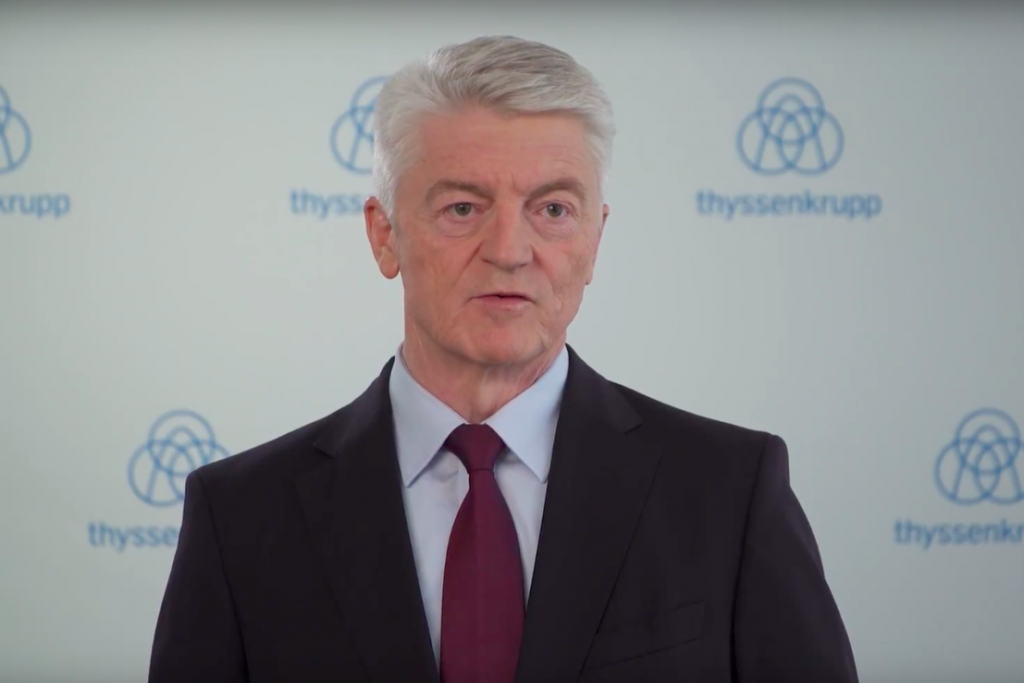Thyssenkrupp shareholders get impatient for change

DUESSELDORF/FRANKFURT, Dec 20 (Reuters) – Some investors in German industrial conglomerate Thyssenkrupp are becoming impatient with the pace of its restructuring, putting pressure on Chief Executive Heinrich Hiesinger to fix underperforming units and revive its flagging share price.
In the job since 2011, Hiesinger is seeking to transform the sprawling engineering and steel group into a company with a focus on high-tech elevators, the construction of industrial plants, materials trading and its businesses serving car makers, its biggest single customer group.
Since he took over nearly seven years ago, shares in Thyssenkrupp are down about a fifth, underperforming an 87-percent rise in the DAX but better than the 55-percent decline of ArcelorMittal, the world’s biggest steelmaker.
But for some investors that’s not good enough.
“There are areas that are lagging expectations and need fixing,” one of Thyssenkrupp’s top 20 shareholders said, declining to be named.
The muted performance even caused activist investor Cevian, Thyssenkrupp’s second-largest shareholder with an 18-percent stake, to recently question whether the group’s conglomerate structure was still appropriate.
Hiesinger, in a letter to shareholders last month, said it was still Thyssenkrupp’s goal to enable the “optimum development of all business areas so as to strengthen the performance of the group as a whole”.
Cevian, in the meantime, has repeatedly suggested a demerger of better-performing units, including Thyssenkrupp’s most profitable elevator business that accounts for almost half of its operating profit, calls which Hiesinger has so far resisted.
“The major break-through is still lacking,” said Thomas Hechtfischer, managing director of shareholder advisory group DSW, which usually represents 1 percent of Thyssenkrupp’s voting rights at its annual general meeting.
Hiesinger has spent a lot of resources on severing ties to Thyssenkrupp’s steel business, whose roots go back more than 200 years, and in September struck an initial deal to merge its European steel unit with that of Tata Steel.
In focus
“Other divisions have perhaps not been in focus that much as a result and that poses a problem now,” said Ingo Speich, fund manager at Union Investment, a top-20 shareholder that owns about 0.3 percent of Thyssenkrupp.
“Profitability levels of the individual businesses show that there is still a lot of room for improvement.”
Investors and analysts are most concerned about Thyssenkrupp’s Industrial Solutions division, which builds plants, ships and submarines and has been hit by low-margin legacy orders and weak demand for plant in recent years.
Thyssenkrupp has already unveiled job cuts and recently announced a five-year high in orders at the division, but at 2 percent its operating margin is still below the 6-7 percent medium-to-long term target.
“I think the division is more cyclical than we all thought,” said Bjoern Voss, analyst at Warburg Research. “Now the division needs to be restructured.”
Some analysts also expect that Thyssenkrupp will at some point sell Materials Services, its materials distribution and trading division, a move analysts at Credit Suisse say would be a “major catalyst” for the group’s stock price.
The division’s operating margin stood at 2.3 percent in the last financial year, compared with a mid-term target of 3-4 percent.
Smaller German steel distributor Kloeckner & Co has expressed an interest in some parts of Materials Services, but said last week no talks were currently underway about a possible consolidation.
So far, Thyssenkrupp only wants to sell a small part of the division — Acciai Speciali Terni (AST), its Italian stainless steel unit, which made 1.78 billion euros ($2.11 billion) of sales in 2016/17 and has been labelled non-strategic.
The Alfried Krupp von Bohlen and Halbach Foundation, Thyssenkrupp’s largest shareholder with a 21 percent stake, declined to comment.
($1 = 0.8421 euros)
(Reporting by Tom Käckenhoff and Christoph Steitz; Editing by Greg Mahlich)
{{ commodity.name }}
{{ post.title }}
{{ post.date }}




Comments